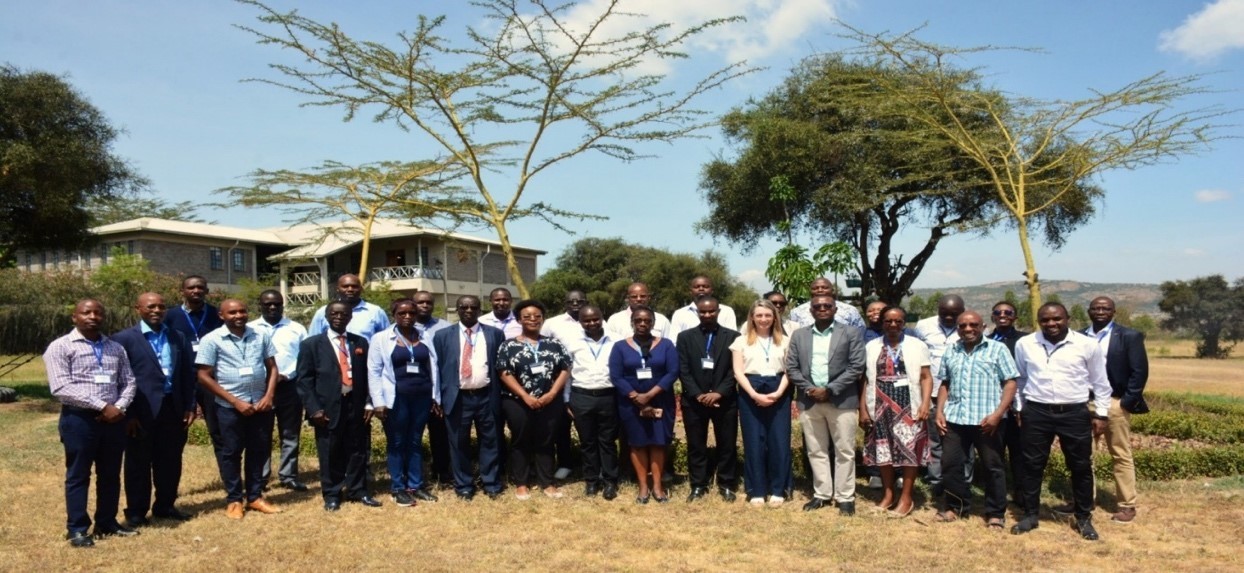
Participants of the stakeholder workshop held on March 19, 2024 at Maanzoni Lodge, Kenya. It attracted over 35 participants.
Kenya has made significant strides in its renewable energy sector, with an estimated 88% of its grid mix in 2022 derived from renewable sources such as geothermal, wind, and solar power. This growth is attributed to favorable policies, international treaty obligations, and regulatory improvements. Despite this progress, solar and wind energy accounted for only 16% of the total generation mix in the 2022/23 financial year, highlighting the untapped potential for expanding these resources.
To address the barriers hindering the full potential of renewable energy (RE) in Kenya, ACTS and the Stockholm Environment Institute (SEI), supported by the Climate Compatible Growth (CCG) consortium, launched a comprehensive Energy Policy project. This project examines the implementation challenges and opportunities related to Feed-in Tariffs (FiTs) and Renewable Energy Auctions (REA) policies.
On March 19, 2024, a stakeholder workshop was held at Maanzoni Lodge, Kenya, bringing together over 35 participants from government, academia, the private sector, and policy-making bodies. The workshop aimed to validate the project's findings and foster a collaborative approach to enhancing Kenya’s renewable energy policies.
Participants of the stakeholder workshop at Maanzoni Lodge, Kenya. Key Insights from the workshop were: FiTs guarantee a fixed price per kWh generated from renewable sources, while REAs involve competitive bidding for projects, with the lowest bid typically winning. Both mechanisms aim to promote renewable energy but face different implementation challenges in Kenya’s unique political and economic context.
Challenges Identified
Slow transition to auction policies and lack of stakeholder engagement; grid integration and energy storage deficiencies, financing deficits and unclear regulatory frameworks and inadequate resource assessment and high energy costs.
Proposed Solutions
Digitalizing power systems and investing in renewable energy storage infrastructure; clear regulatory Powering transition to sustainable energy systems in Kenya:perspectives of stakeholders about Feed-in Tariffs (FiTs) and Renewable Energy Auctions (REA) policies frameworks and economic incentives; renewable energy resource mapping and rethinking least-cost development plans; establishing industrial parks to boost demand for renewable energy and enhanced stakeholder engagement and multidisciplinary committees for policy formulation.
Literature review highlights
A thorough review of policies and academic articles from 2008 to 2023 revealed significant opportunities and constraints in Kenya’s renewable energy sector. Key opportunities include technological advancements, increased local and global investment in RE, and supportive government policies. Major constraints include financial limitations, market factors, and policy challenges.
Stakeholder survey findings
An online survey conducted in July 2023 highlighted active engagement in the renewable energy sector but identified weaknesses in the involvement of academia and research institutions. Policy and institutional challenges were noted as major obstacles to implementing FiTs and REA policies effectively.
Future pathways and policy recommendations
Participants in the workshop discussed practical strategies for a smooth transition to REAs, emphasizing the need for clear responsibilities, grassroots involvement, and alignment with broader energy goals. Key recommendations included:developing clear regulatory guidelines; strengthening capacity across all stakeholder groups; addressing market and infrastructural challenges; enhancing public-private partnerships and revising time frames for policy implementation.
Conclusion
Kenya's journey towards a fully renewable energy grid requires concerted efforts from all stakeholders. Effective engagement, robust regulatory frameworks, and innovative solutions to existing challenges are crucial for achieving sustainable energy goals. The insights from the workshop provide a roadmap for future policy interventions, ensuring Kenya can harness its renewable energy potential fully.
Acknowledgement
This project was implemented by the African Centre for Technology Studies (ACTS) led by Dr Ann Kingiri, Josephat Okemwa and Yvonne Gitu and the Stockholm Environment Institute (SEI) led by DrAnderson Khebila, Mbeo Ogeya, Moses Kirimi and Cynthia Sitati with technical support from the Climate Compatible Growth (CCG) consortium led by Julia Tomei (University College London, UCL, UK) andStephanie Hirmer (Oxford University, UK). It was supported through the CCG - Flexible Research Fund (FRF), advanced by the Foreign and Commonwealth Development Office (FCDO) and delivered byLoughborough University, UK. The project team from ACTS and SEI also acknowledges the great support from the project participants (during the fieldwork or during the workshop)

